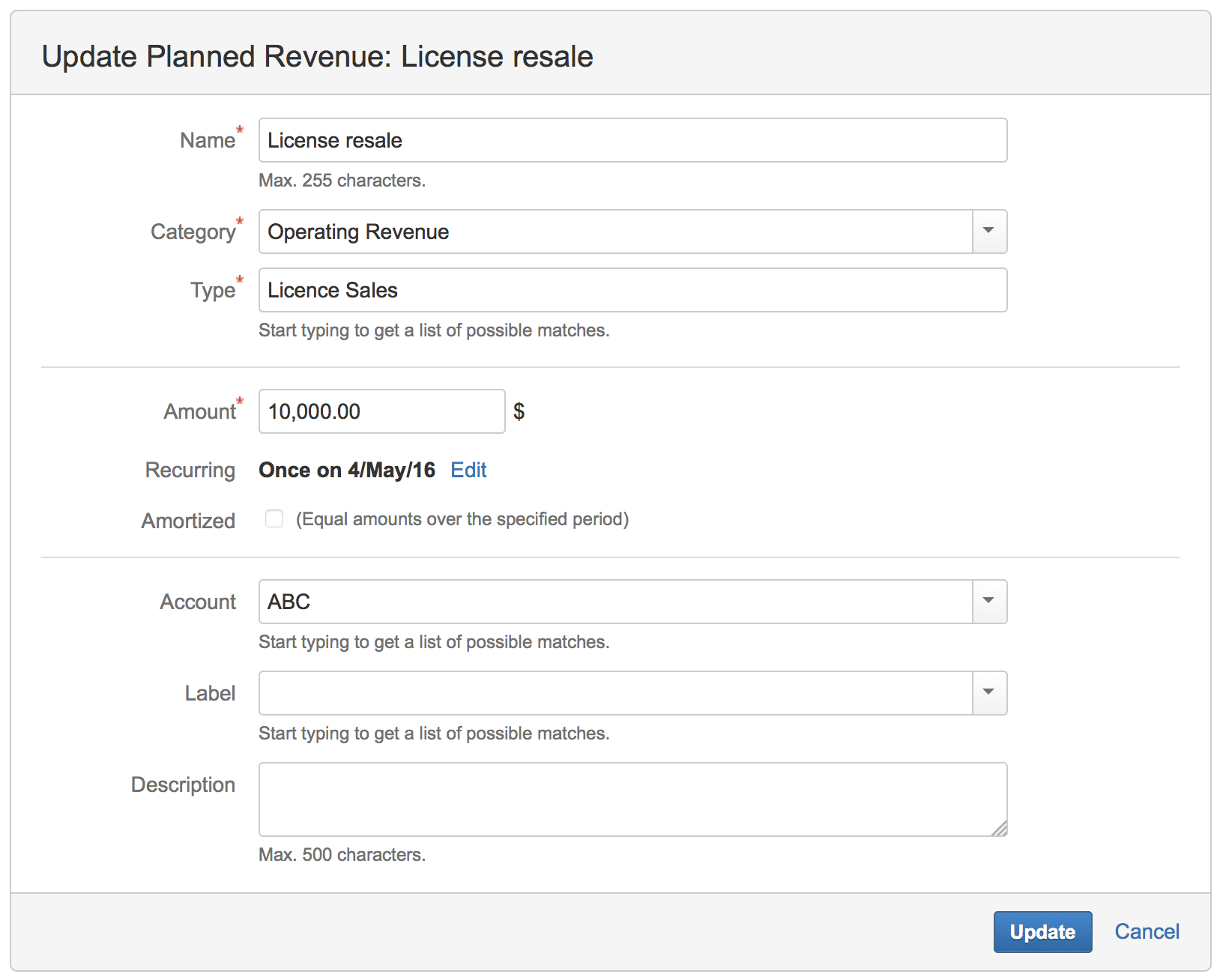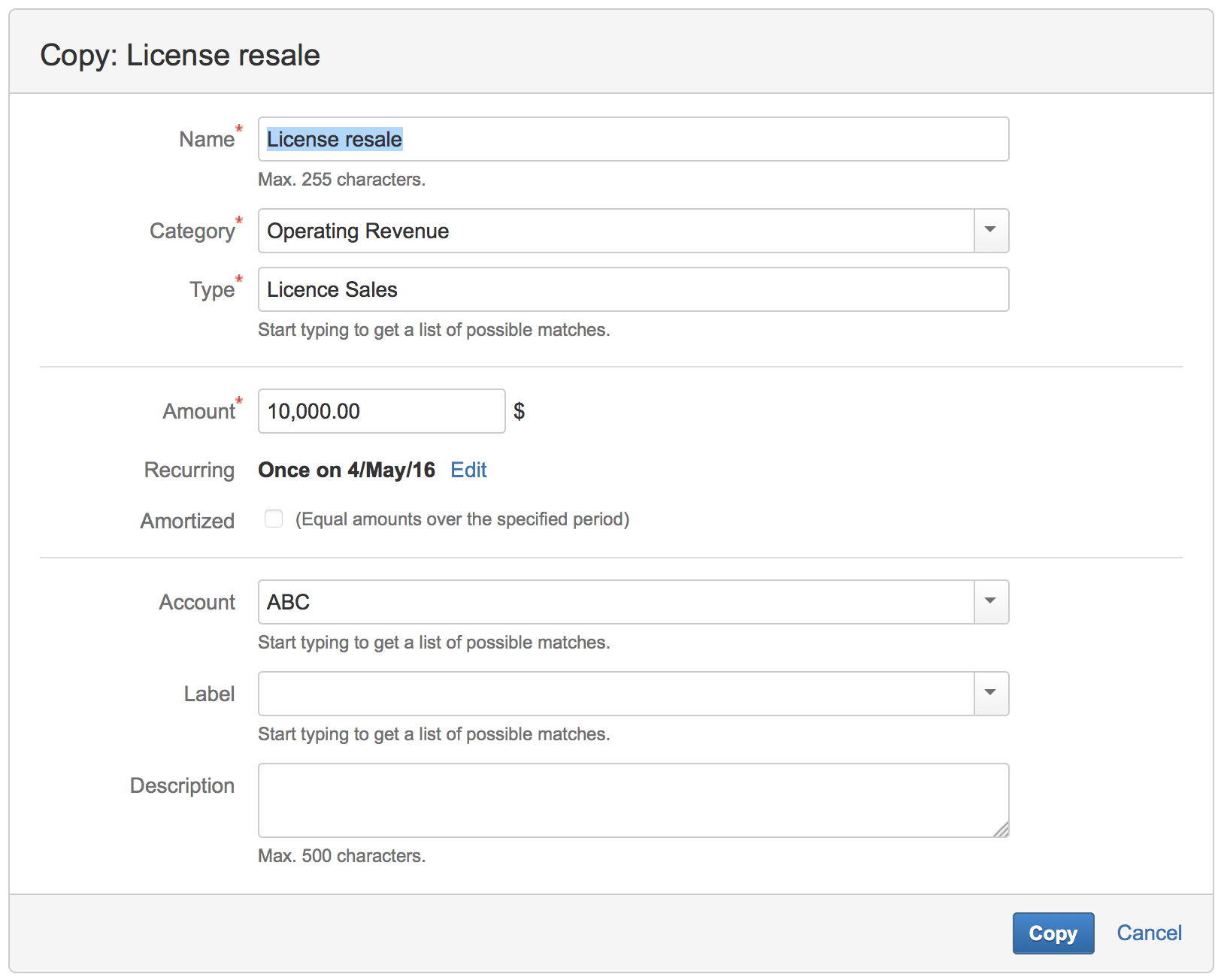Editing a non-consulting revenue
You can select edit an existing non-consulting revenue and easily modify it. In the revenue details view at the right, click the ellipsis (...) and select Edit, or hit the "e" (for edit) shortcut key to display the Update Planned Revenue dialog.

|
Name |
Name of the revenue. Examples: ABC Software License Sales, 101 Main Street, etc. |
|---|---|
|
Amount |
Amount of the revenue. Note that in the case of a recurrent revenue, the amount of the payments received for that revenue will depend if it is amortized or not. In the case of an amortized revenue, the amount will be evenly split over the number of payments defined in the recurrence definition. Otherwise, the amount of each payment is the amount entered here. |
|
Category |
Category of the revenue. See section Categories for more details on each option. |
|
Type |
Type of revenue. This gives you access to a list of pre-defined revenue types you can use to classify your revenues and for filtering in reports. You can begin typing in this field to quickly find a match, or click the drop-down arrow to select from the list. You require Tempo Account Administrator permissions to add to or edit the list of Expense or Revenue Categories (types). To access the Expense Categories (used to define expense and revenue categories) select Tempo > Settings. |
|
Recurring |
By default, a non-consulting revenue occurs on a single date. To edit the date or to make the revenue recurrent (and possibly amortized), click the Edit link to access a dialog to define the recurrence for that revenue. As you edit values in the dialog, the recurrence summary updates dynamically in the text field located immediately above. Refer to Recurrence for more details. |
|
Amortized |
Specifies if the received payments for that revenue be should split over a period of time or not. This option appears under the Recurring field when the Repeat value in the Recurrence definition dialog is changed to something else than Once. When amortized, the this revenue gets evenly split into payments occurring on dates defined in the Recurring field. |
|
Account |
Specifies the Tempo Account to associate the expense with. (optional) |
|
Labels |
Jira Issue Labels to associate the revenue with. Refer to Labels for more details. |
|
Description |
You can choose to enter a description of the revenue. |
Copying a Revenue
You can select an existing revenue to copy and then either click the ( 

Deleting a revenue
You can select edit an existing non-consulting revenue to delete then click the ellipsis (...) and select the Delete option or hit the d (for delete) shortcut key to display the Delete dialog. Click Delete to confirm the deletion, or Cancel link to abort. Note that a deletion cannot be undone, so be sure ithat you really want to delete the revenue before proceeding.
You can delete multiple revenues at once. Refer to the Multiple Selection to learn how to perform a batch deletion.
Attaching files to a revenue
You can attach files to a revenue in order to keep related documents handy (invoices, quotations, etc.). To attach files to a revenue, select it and then click button Attach Files in revenue details panel on the right. This brings up a dialog where you can pick a file (or multiple files simultaneously, if your browser allows it) and enter an optional comment.
Viewing Revenue details
When selecting a revenue, more information on that revenue is displayed in the details panel on the right. Note that you can also select multiple revenues at once by selecting multiple lines. This provides you an aggregated view showing the total income associated with these revenues.
Searching for revenues
You can search for revenues by their name using the search box located at the top left of the screen.
